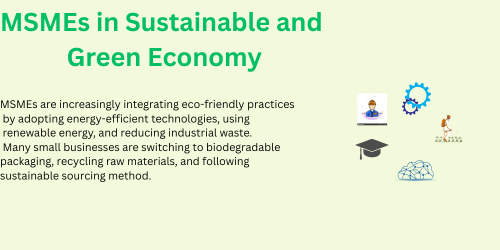
How are MSMEs contributing to the adoption of eco-friendly practices in India?
SMEs are increasingly integrating eco-friendly practices by adopting energy-efficient technologies, using renewable energy, and reducing industrial waste. Many small businesses are switching to biodegradable packaging, recycling raw materials, and following sustainable sourcing methods. Industries like textiles, food processing, and handicrafts are particularly active in implementing green manufacturing. MSMEs are also participating in carbon footprint reduction by optimizing logistics and resource use. Additionally, government schemes promoting clean technology adoption have motivated MSMEs to embrace sustainable operations. These efforts collectively support India’s climate goals and demonstrate how small enterprises can drive big changes in environmental protection and sustainability.
What are the main challenges faced by MSMEs in transitioning to a green economy?
The biggest obstacle facing SMEs as they transition to a green economy is financial constraints. Many may not have the funds to purchase clean technology or new, energy-efficient equipment. Another obstacle is a lack of understanding about sustainable practices and their long-term advantages. Progress is further hampered by a lack of technological know-how, competent labor, and limited access to green financing. Furthermore, smaller businesses may find it difficult to comply with environmental standards. Large-scale adoption of green business models is challenging for MSMEs since they frequently put survival and cost-cutting ahead of sustainability in the absence of sufficient support, education, and incentives.
How can government incentives encourage MSMEs to adopt sustainable business models?
Incentives from the government are essential for assisting business in switching to sustainable business strategies. The cost burden of implementing eco-friendly technologies can be reduced with financial assistance in the form of green loans, subsidies, and tax breaks. Programs for technical support and training sessions can raise awareness and improve capacity building. Small firms can more easily achieve sustainability through policies that support waste management, energy-efficient procedures, and the use of renewable energy. Wider adoption is also encouraged when green SMEs are acknowledged and rewarded with certifications or preferential treatment in public procurement. By making sustainability a viable choice for SMEs, these focused initiatives help hasten the transition to a green economy.
What role does renewable energy play in the sustainability of MSMEs?
Renewable energy plays a vital role in improving the sustainability and cost-efficiency of business. By switching to solar, wind, or bioenergy sources, Local Enterprises can reduce their dependence on costly and polluting fossil fuels. This shift not only lowers carbon emissions but also protects businesses from energy price volatility. Rooftop solar installations, for example, offer a long-term power solution with minimal maintenance. Government support through subsidies and grid connectivity has made renewable energy more accessible. As many MSMEs operate in remote or rural areas, decentralized renewable solutions enable uninterrupted operations, supporting both environmental goals and business continuity in a sustainable manner.
What are some successful examples of green MSMEs in India or globally?
Numerous MSMEs have successfully implemented green models both in India and beyond. For instance, to save energy, Greenwear, an MSME in the Indian textile industry, employs solar-powered looms. Another Indian firm, EcoSoul Home, produces biodegradable cookware and ships it all over the world. Used coffee grounds are recycled globally into environmentally beneficial biofuels by Bio-bean in the UK. EcoPost addresses pollution and infrastructural issues in Kenya by converting plastic trash into long-lasting fencing posts. These illustrations highlight how entrepreneurship, sustainability, and innovation can come together to create successful, environmentally responsible companies. For other MSMEs wishing to embrace green practices and support a sustainable economy, they act as motivating role models.
How can MSMEs balance profitability with environmental responsibility?
Balancing profitability with environmental responsibility is achievable for MSMEs through strategic planning and innovation. Investing in energy-efficient machinery and waste-reducing technologies can lead to long-term cost savings. Sustainable practices such as recycling, reusing materials, and reducing resource wastage enhance operational efficiency. Branding products as eco-friendly also adds market value and attracts environmentally conscious consumers. Government incentives further reduce the financial burden of green transitions. Additionally, MSMEs that prioritize sustainability often see improved investor interest and customer loyalty. By aligning business goals with environmental values, MSMEs can create a competitive edge while contributing to ecological well-being and economic success.


